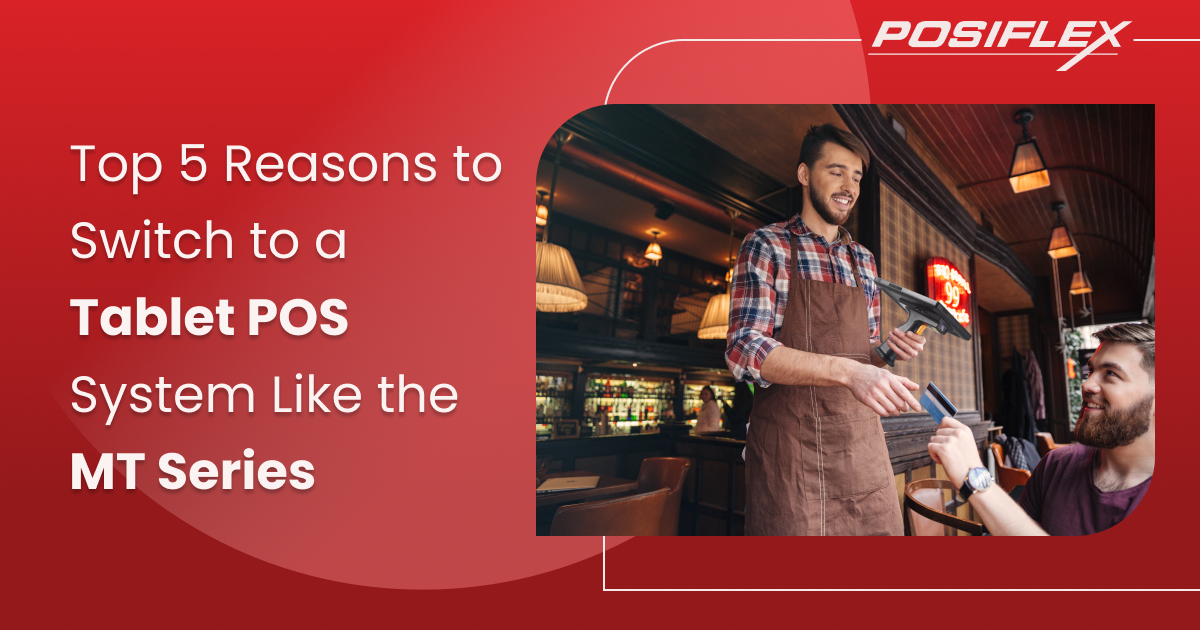
POS tablets can significantly enhance the efficiency of your operations management and POS device ecosystem. Therefore, in our previous blogs, Top Benefits of Using a Tablet POS: How POSIFLEX’s MT Series Can Transform Operations and Why Tablet POS is the Future: A Look at the POSIFLEX MT Series, we examined the following:
However, for a quick, scannable read to empower new entrepreneurs investing in POS devices, we will take a qualitative approach in this blog. Hence, we will briefly list the top 5 attributes of POS tablets and their corresponding features that set them apart from other types of billing machines.
Let’s begin!
Businesses should include POS tablets in their operations for the reasons below:
1. Compactness
Mobile POS systems usually have an integrated or all-in-one design or are paired with small side attachments for end-to-end operations management. Thanks to this compressed yet comprehensive structure, many businesses struggling with space crunch can use the device without compromising on functionality.
Advanced mobile POS systems such as the POSIFLEX MT series not only sport a slim structure but also feature:
The Windows POS supports Wi-Fi 5 and Bluetooth 5.0 versions, while the Android-powered tablets boast Wi-Fi 6 and Bluetooth 5.2 versions.
Additionally, the tablet can be paired with 2-in-1 side attachments that include:
2. Mobility and Ease-of-Use
Unlike other POS devices, POS tablets offer mobility, are lighter, and have larger screens. Thus, the devices are ideal for constant handling during long hours.
Apart from being lightweight and mobile and featuring 8” or 10” screens (in Android and Windows versions, respectively), the MT series POS tablets have a protective cover, which comes with a shoulder strap and a hand strap, elevating the device’s ease of use. It is worth emphasising that the hand strap fits both left-handed and right-handed users.
3.Robustness
Modern tablet POS systems for restaurants and industrial use prove that structural robustness has nothing to do with the space the device occupies. Hybrid POS (tablets) devices, such as the ones from the MT Series, are as robust as they are mobile. This is what makes them perfect for harsh industrial environments like manufacturing units, warehouses, etc. The device, encased in its protective cover with an anti-slip design, has an IP54 rating. The certification attests to water-splash resistance and protection from limited dust exposure. Also, the device becomes drop-resistant for up to a falling height of 1.2m.
The MT Series mobile POS systems are also guarded by Corning Gorilla III cover glass.
4. Efficiency
What defines the efficiency, i.e., the computing speed, of modern POS tablets is their processors and the Operating Systems(OS), which in turn depend on the ISA variant of the processor. Modern POS tablets generally have powerful processors, which further ensure the device’s readiness for a good OS.
For example, the Android 13 avatar of the POSIFLEX MT Series has the MediaTek MT8786 processor with the RISC ISA variant. The ISA makes the POS tablet Android-compatible. Alternatively, the tablets operating on Windows 11 have the Intel Elkhart Lake processor. The processor’s x86 ISA variant ensures the POS system is suitable for the Windows 11 Operating System. The OS and the processors are among the most performance-boosting ones currently available.
The information processing speed is also determined by the device’s RAM and storage capacity. In the case of the POSIFLEX MT Series, the POS tablet’s Android versions have 4 GB of RAM in models with 64 GB of storage, whereas the 128 GB storage mobile POS systems have 8 GB of RAM.
Further, all MT Series Windows-11-compatible POS tablets feature 8GB of RAM with two storage capacity options, 64GB and 128GB.
5. Offline Capabilities
Latest Operating Systems, such as Android 13 and Windows 11, make POS tablets, including the ones from the POSIFLEX MT Series, great for optimal offline performance. Thus, vital tasks like transaction logging and stock management remain undisturbed, even in low- or no-network zones. Warehouses, manufacturing units, and cold storage of restaurants are a few examples of environments with poor connectivity.
Offline performance is also decided by the tablet’s RAM and storage because the edge data might be required to be stored locally for a long time before being uploaded to the Cloud.
On a different note, when edge data is stored due to security issues, the storage capacity and the RAM become even more vital for upholding the performance level of the tablet POS; the RAM and storage specifications of the MT Series POS tablets (Android/Windows) are mentioned above. It is worth adding that to ensure more local data storage, the device has a TF card slot, which expands the device’s storage capacity by up to 512 GB.
Curious to know more about our mobile POS systems? Contact us now, and one of our executives will get in touch with you soon!
Copyright © 2026 Posiflex Technology, Inc. All Rights Reserved.
WhatsApp us